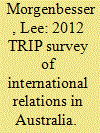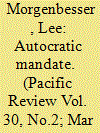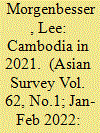|
|
|
Sort Order |
|
|
|
Items / Page
|
|
|
|
|
|
|
| Srl | Item |
| 1 |
ID:
119080


|
|
|
|
|
| Publication |
2013.
|
| Summary/Abstract |
This article analyses the results of the most recent and largest cross-national survey on the international relations discipline. Completed by scholars in 20 countries, the survey covered the areas of teaching, research, foreign policy, the profession, and the relationship between policy and academia. From an Australian perspective, the key findings include the strong link between what academics teach and research; the narrowing epistemological gap between the USA and Australia; the curious pessimism of scholars on a wide range of foreign policy issues; and the ability of scholars to define research quality independently of other national settings. The most significant and alarming finding, however, concerned how the present structure of the field is undermining scholars'attempt to forge closer, more influential ties with policy makers in Canberra. In fact, it is clear from the results that what academics research and how they go about it is actually counterintuitive to this goal. The article concludes with three recommendations aimed at rectifying this problem.
|
|
|
|
|
|
|
|
|
|
|
|
|
|
|
|
| 2 |
ID:
151445


|
|
|
|
|
| Summary/Abstract |
This paper explains how authoritarian regimes employ flawed elections to obtain both short-term legitimacy and long-term stability. In conjunction with the use of co-optation and repression, it argues that ruling parties hold de jure competitive elections to claim what is termed autonomous legitimation. This denotes the feigning of conformity to the established rules of the constitution and the shared beliefs of citizens. Regardless of overall turnout and support, ruling parties exploit the normative and symbolic value of elections in order to establish moral grounds for compliance within a dominant-subordinate relationship. In support of this argument, the case of Singapore's People's Action Party (PAP) is analysed in historical and contemporary terms. Since 1959, the PAP has used precisely timed elections to extract one or more mandate types from citizens and, by extension, claim legitimacy. In particular, it has sort a mandate based on its response to an event, execution of a policy and/or collection of a reward. In the long run, autocratic stability has been achieved through a process of reciprocal reinforcement, which has combined autonomous legitimation with targeted co-optation and low intensity coercion. The paper concludes by addressing the generalisability of this finding for other authoritarian regimes in Southeast Asia.
|
|
|
|
|
|
|
|
|
|
|
|
|
|
|
|
| 3 |
ID:
185206


|
|
|
|
|
| Summary/Abstract |
In 2021, Cambodia confronted the full impact of the COVID-19 pandemic. Amid a surge in case numbers and total deaths, the virus brought new and profound consequences for the Southeast Asian nation. A spate of decrees, laws, and provisions provided Hun Sen’s government ways to contain the outbreak, along with an opportunity to further stifle political dissent. The economic effects of the crisis were acutely felt in the crucial tourist industry and garment sector, both of which experienced severe contraction that will be long-lasting. Beyond the COVID-19 pandemic, Cambodia’s foreign affairs were dominated by its friendly relationship with China, poor reputation within the United States, and pending chairmanship of ASEAN.
|
|
|
|
|
|
|
|
|
|
|
|
|
|
|
|
|
|
|
|
|